Thursday Feb 26, 2026
Thursday Feb 26, 2026
Friday, 15 February 2019 00:20 - - {{hitsCtrl.values.hits}}
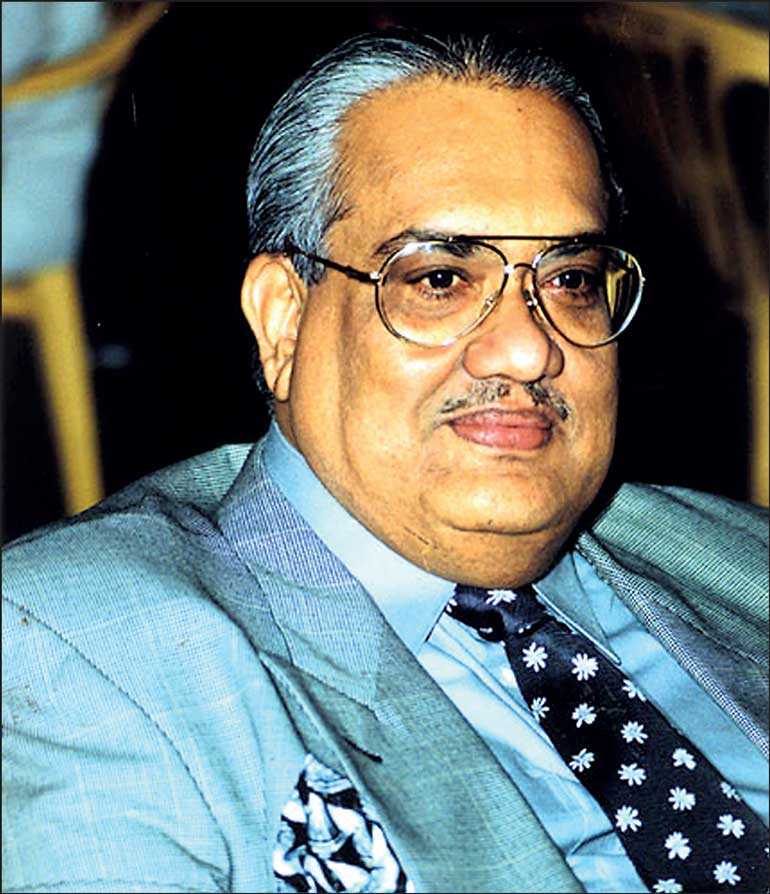
‘The Man Who Would Be King’ is the title of a long tale written by Rudyard Kipling in 1888. This very popular story was made into a successful film starring Sean Connery, Michael Caine and Christopher Plummer by the well-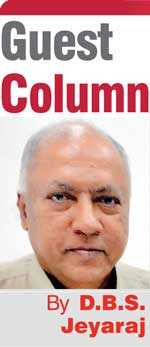 known director John Huston in 1975.
known director John Huston in 1975.
The objective of this article however is not to write about the story or film but to focus on a man who always wanted to be king but was unable to mount the throne. A man who was the son of two Sri Lankan Prime Ministers and was often referred to as the “Crown Prince” within the context of Sri Lanka’s dynastic politics. A man who held many high posts but was never the prime minister or president of this country and in that context was termed “the Crown Prince who was not crowned king”. I write of Anura Bandaranaike, known generally as Anura, whose 70th birth anniversary is being commemorated today (15).
Greatness in different degrees
William Shakespeare’s Malvolio in ‘Twelfth Night’ defines “Greatness” as being of three types. According to Shakespeare, the three categories consist of some who are “born great,”, some who “achieve greatness” and some who have “greatness thrust upon” them. Anura Bandaranaike, a Shakespeare aficionado, was an embodiment in different degrees of this greatness as defined by the bard of Avon.
Anura was born great as the only son of Solomon West Ridgeway Dias Bandaranaike and Sirima Ratwatte – hailing from aristocratic low-country and Kandyan Sinhala families – who were both prime ministers of this country. This accident of birth enabled Anura to have greatness thrust upon himself to some extent.
Being elected as a 28-year-old Member of Parliament in an unfamiliar electorate on his maiden effort was more due to his family background rather than his intrinsic merits. So too was becoming the Leader of the Opposition at the age of 34. Anura also achieved limited greatness. He was both Cabinet Minister and Speaker. He was also in Parliament continuously from 1977 till his death in 2008. Yet he never realised his full potential as a political leader or attained his ambition to be premier and/or president.
Anura Bandaranaike was the grandson of Maha Mudliyar Bandaranaike and Ratwatte Disawe. The marriage of his father Solomon Bandaranaike and mother Sirima Ratwatte was hailed then as a political union between two prestigious Low Country and Hill-Country Sinhala families. The wedding was the beginning of a new political dynasty – What a political dynasty that was! 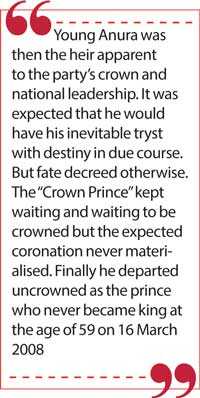
In the first 60 years of independence from 1948 to 2008 there has always been a Bandaranaike in the Legislature (Parliament or Senate) except for 10 months from September 1959 to July 1960. Members of the family have been prime ministers for 21 years; president for 11 years; leaders of the opposition for 14 years; with Chandrika’s “retirement” and Anura’s demise, that dynasty has come to an end (unless Chandrika’s children Yasodhara and/or Vimukthi enter politics).
Anura Priyadarshi Solomon Dias Bandaranaike was born on 15 February 1949. Being the youngest child he was called “Malli” and regarded as the family pet. Unlike his father S.W.R.D. Bandaranaike who studied at S. Thomas’ College and then went to Oxford University, Anura went to Royal College and then to a university in London where he read for a BA degree specialising in history and political science. His political detractors had a field day raising doubts about his educational qualifications. They ridiculed him as “Anura Gona” and claimed that he had not even passed his GCE O/Levels. Anura was compelled to display his certificates publicly at one point. Among Anura’s contemporaries at Royal were Prime Minister Ranil Wickremesinghe and MEP Leader Dinesh Gunawardena.
Plunge into politics, the family “vocation”
Upon his return to Sri Lanka in 1974, Anura plunged with zest into the family “vocation” of politics. He was placed in charge of the Sri Lanka Freedom Party (SLFP) Youth Wing and also appointed as a Director of the National Youth Services Council.
Young Anura was then the heir apparent to the party’s crown and national leadership. It was expected that he would have his inevitable tryst with destiny in due course. But fate decreed otherwise. The “Crown Prince” kept waiting and waiting to be crowned but the expected coronation never materialised. Finally he departed uncrowned as the prince who never became king at the age of 59 on 16 March 2008.
Anura Bandaranaike was to the Manor (or Walauwe) born and the tragedy of his life was that he was always conscious of it. He thought that being a Bandaranaike entitled him to the highest offices of the land. That however was not to be. Many persons would have been delighted to have gained at least a part of what Anura Bandaranaike had had in terms of political office. But the man had set his sights on something he thought was his birth right. Being born with the proverbial silver spoon in his mouth, Anura expected everything would be delivered to him on a platter. This never happened and so he was disillusioned and disappointed.
Within the context of South Asian dynastic political succession, Anura too expected to be a democratic “king” one day. This expectation he felt was his destiny. He was conscious of his family background and pedigree in this respect and never tried to hide it. In fact he used to flaunt it around at times and was subject to charges of snobbery. Extracts from a speech made in Parliament in 1999 provides an illuminating insight into Anura’s mindset on these matters:
“The Hon. Lakshman Kadirgamar says that I constantly flash my pedigree, something that my distinguished sister never does. My distinguished sister never used the Bandaranaike name till she joined the SLFP in 1992 and Sir, all of you know that. She only used the name Chandrika Bandaranaike Kumaratunga when she contested the chief ministerial post in 1993 and furthermore she does not need to flash her pedigree because she has attained the highest office in this country thanks to her father, thanks to her mother and thanks to her pedigree.
“Why did Sonia Gandhi become the Leader of the Congress Party? Because of her name. Why did Shiekh Hasina become the Leader of the Awami League? Because of her name.Why did my good friend Benazir Bhutto become the Prime Minister of Pakistan, the first elected woman leader of an Islamic nation? Because of her name.
Because of her pedigree.”
“Mr. Deputy Chairman of Committees, yes, I agree with the Hon. Lakshman Kadirgamar that I flash my pedigree. I have a pedigree that is worth flashing and I will flash it with a vengeance at all times. My father was one of the most respected leaders of this nation, which is universally acclaimed. My mother was the first elected woman Prime Minister of the entire world — six years before Mrs. Indira Gandhi was elected Prime Minister — and who is in office even for the third time today. She firmly placed Sri Lanka on the world map and became the leader of the Non-Aligned Movement, adding glamour and stature to this little island nation. Her name is the only Sri Lankan name that is known in any part of the world. In the Middle East, as the Hon. Alavi Moulana knows, it is her name that is known, nobody else’s.
“I have a pedigree that is worth talking about, Sir. I am proud of that. Whatever political disagreements I have with my sister, she is the elected President of this country, elected with a massive majority. Permit me to boast a little about myself because I am answering his questions. I was the youngest Leader of the Opposition in the Commonwealth in 1983 serving 22 years in this House continuously. Yes, Sir, I am proud of my pedigree and I can shout about it from Iceland to New Zealand.”
Why did Anura fail to reach the top?
The above extracts from Anura’s speech indicate clearly that he was proud of his pedigree and felt he was entitled to “rule” Sri Lanka one day on account of that. Why then did Anura fail to reach the top in politics as Premier or President? Why did he fail in this respect?
A very close relative of his (not from immediate family) blamed Anura’s mother Sirima Bandaranaike for this. This relative known for speaking out frankly and forthrightly responded to my queries in this way: “Anura to me was very kind-hearted. It was not easy being Anura B. Always under the microscope. He had all kinds of friends. Genuine ones were very few. People he could trust… When Anura spoke or had to express opinions it was thoughtfully and thoroughly researched. As a president he would have done well…
“Unfortunately he had a foolish mother. Mrs. B ruined AB’s chances of any proper leadership. He needed family. He needed his mother’s love. He was surrounded by people who got him to drink. It was terrible. No family love, bad friends and a life wasted. Peace in good family relationships is the ‘peace’ we all strive for… Anura had a moral compass. He was approachable. He had a big heart. He was honest. He had more Bandaranaike qualities.”
If this was the viewpoint of a fond relative, another close friend of his who had interacted with Anura for many decades had a somewhat different take about Bandaranaike. Here are a few excerpts: “Anura was a man who belonged to another generation of political species, a ‘true parliamentarian,’ who expected politics to be fought in the sacred floor of the House rather than in the streets and gutters. In the JRJ era he was clearly not cut out for the turn that Sri Lankan politics took and the chicanery and corruption that came with it.
“One reason why such a clever democrat never reached the top is perhaps because he was surrounded by ‘catchers’ who fed him the tale that a man born of such pedigree such as he did not need to dirty his sarong in the political gutters of the island and that success was ‘just around the corner’. Knowing him well, had sound advice been given to him, I feel he could and would’ve changed track.
“His sound research before speaking in the House was a hallmark of his great intellectual curiosity. He was a ‘mental’ rather than a ‘physical’ personality, which is why his ‘pressing the flesh’ has been better displayed by his charismatic sister Chandrika. Being the youngest in a family dogged by tragedy is perhaps why he was also protected by his sisters and spoilt to an extent. His finest hour was when he was Speaker and he really enjoyed being such.
“Despite never reaching the summit, Anura has left a legacy of sorts in the island, in that if a young budding parliamentarian, who believes in parliamentary democracy and wants a figure to emulate, they could study him as one role model.”Former Western Provincial Councillor and a close confidante of Anura Bandaranaike, Gamini Gunaratne had a pithy, perceptive observation about the political failure of Anura Bandaranaike. Gunaratne, known as “Batta” to friends, was quoted extensively in an article written by Shamindra Ferdinando that appeared in ‘The Island’ some years ago. The relevant paragraph is excerpted here:
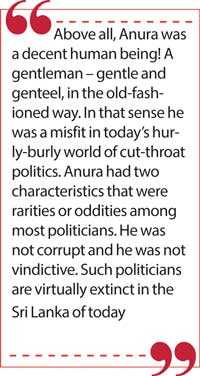 “Gamini Gunaratne was convinced that Bandaranaike had the required background to lead the country but never understood the ground reality or local politics. Had he understood the logic expressed in Barbara W. Tuchman’s book, ‘The March of Folly: From Troy to Vietnam,’ Bandaranaike would have been wiser. But unfortunately that wasn’t the case. Tuchman defined folly as ‘pursuit of policy contrary to self-interest’ and that was exactly what Bandaranaike did, he said. Avid reader Bandaranaike hadn’t grasped Tuchman’s message.”
“Gamini Gunaratne was convinced that Bandaranaike had the required background to lead the country but never understood the ground reality or local politics. Had he understood the logic expressed in Barbara W. Tuchman’s book, ‘The March of Folly: From Troy to Vietnam,’ Bandaranaike would have been wiser. But unfortunately that wasn’t the case. Tuchman defined folly as ‘pursuit of policy contrary to self-interest’ and that was exactly what Bandaranaike did, he said. Avid reader Bandaranaike hadn’t grasped Tuchman’s message.”
Anura, the person
Pedigree played a crucial part in Anura being an MP, Opposition Leader, Speaker and Cabinet Minister, etc. at different times. Yet in his own right Anura Bandaranaike was an impressive orator in both Sinhala and English. He extensively researched facts before his Parliamentary speeches. He was one MP who made full use of the Parliament library delving deep into past Hansards.
He was also well-versed in Shakespeare’s plays and the Bible and would often aptly quote from them. Anura’s parliamentary address on the occasion of former British Prime Minister Margaret Thatcher’s visit in 1985 was a splendid effort. It was perhaps the best indication of Anura being a chip of the old block as his father SWRDB had been dubbed “silver-tongued orator”.
Anura Bandaranaike had a peculiar sense of humour and was fond of playing pranks and practical jokes on his friends. One of his regular pranks was to answer marriage advertisements in the names of friends and relatives. Another was to send invitations for dinner to uninvited guests and get them to drop in at the residence of the shocked ‘host’. One of Anura’s favourite targets in these pranks was the late Lankasa de Alwis, his first cousin. Anura would however be miffed if he was at the receiving end of jokes and tricks. But his ‘anger’ never lasted long.
Anura Bandaranaike was an avid reader of books and magazines. He had a fine collection of contemporary fiction as well as biographical books. His interests were eclectic, ranging from Plato to Stephen Crane. He was a voracious reader and had one of the finest libraries in Colombo on current affairs. He loved getting books as gifts from his friends.
A close friend who was bringing him some recently-published political books from abroad, including one on Osama Bin Laden, was about to have it confiscated by a Customs officer at Katunayake since it was about terrorism. On hearing that it was for Anura, the Customs official smiled and said, “That’s okay then,” but in a whisper asked, “Is it true that he’s getting married?” When this was related to Anura, he roared with laughter. Anura Bandaranaike never got married but rumour mills in Lanka worked overtime speculating about his impending marriage with this or that woman!
Anura was also fond of wining and fine dining. He dressed with sartorial elegance. He used to smoke Havana cigars occasionally. Another of his passions was watches. He collected them. Among his possessions was a Cartier watch presented by former Malaysian Premier Dr. Mahathir Mohammad. Anura also prized a watch bestowed with blessings by India’s Sathya Sai Baba at his Puttaparthi ashram. Anura was a Sai Baba devotee. He used to wear a ring presented by the God man on his finger always.
Bandaranaike was fond of travelling. Los Angeles was his favourite city. He would visit LA at least twice or thrice a year sometimes, staying for weeks at a stretch. He was also a film fan since childhood. As a schoolboy Anura had an album where he pasted newspaper and magazine articles about the films he had seen. Later on he acquired an impressive collection of DVDs and also set up a state-of-the-art home theatre system. Anura had a Japanese-made luxurious armchair on which he reclined, watching English and Hindi films. Despite having this arrangement at home, Anura liked to watch current films in movie theatres. The last film he saw in a theatre was Amol Palekar’s ‘Paheli,’ starring Shah Rukh Khan and Rani Mukerjee.
Political career
Anura Bandaranaike’s political career had its ups and downs. In the case of Anura, his sense of political timing was atrocious. He frequently made the wrong move at the wrong time and so was always in the wrong place.
When Anura first contested elections in 1977, he did not do so in the Gampaha District where the Bandaranaike family had much political clout. Instead he went to the Central Province and contested in the three-member constituency of Maskeliya-Nuwara Eliya. It was only a few months before elections in Sri Lanka that parliamentary polls were held in India. Angered by the excesses of Emergency rule, the Indian voters delivered a resounding blow to the Congress which had been in power for 30 years since Independence. Both Indira Gandhi in Rae Bareilly and Sanjay Gandhi in Amethi lost.
The UNP, notably J.R. Jayewardene and Ranasinghe Premadasa, hoped for and sought a parallel result in Sri Lanka. Just as the cow (Indira) and calf (Sanjay) lost in India the cow (Sirima) and calf (Anura) will lose their seats here also, thundered the UNP. The SLFP suffered a disastrous defeat in 1977, winning only eight to the UNPs 141 in a Parliament of 168. But both Sirima and Anura won. The SLFP suffered a temporary split in the Opposition when Anura along with people like Maithripala Senanayake and Haleem Ishak rebelled against Mrs. Bandaranaike’s leadership. President Jayewardene tried to widen the intra-SLFP chasm further. The crisis was ultimately resolved and Anura was politically reunited with his mother.
In 1983 the Tamil United Liberation Front (TULF) forfeited their seats as they refused to take oaths, disavowing separatism under the Sixth Amendment to the Constitution. Mrs. Bandaranaike had been deprived of her civic rights in 1980 and was out of Parliament. So Anura became Leader of the Opposition. He succeeded Appapillai Amirthalingam. S. Perinbanayagam was the former Opposition Leader’s Secretary. When Perinbanayagam appealed to Anura that he be retained as Secretary to Bandaranaike also, the SLFP Leader consented despite the political differences. That was Anura the magnanimous.
While Anura’s sisters Sunethra and Chandrika were left of centre in their political beliefs, Anura was firmly to the right. Anura’s sister Chandrika broke off from the SLFP with her husband Vijaya Kumaratunga and formed a new party the Sri Lanka Mahajana Pakshaya (SLMP) in 1984. After her husband was assassinated by the Janatha Vimukthi Peramuna (JVP) in 1988, Chandrika left for London in a state of self-exile. Chandrika however returned and re-joined the SLFP. This led to tensions between Anura and Chandrika and also between mother and son. Once again Anura was estranged from his mother and sister.
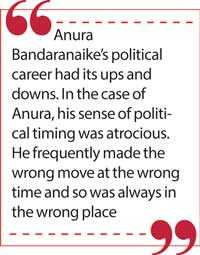
It was in the early nineties of the 20th century that Chandrika returned to SLFP folds again. Mrs. Bandaranaike felt that Chandrika was better equipped to lead the SLFP to victory and favoured her. Anura resented this and instead of resisting such attempts within the party, crossed over to the UNP in 1993. He became the Minister of Higher Education and National Reconciliation under Dingiri Banda Wijetunge. In 1994 the UNP was out of office after 17 years. Anura was in the Opposition again.
Mrs. Bandaranaike’s declining health and consequent death saw an end to sibling enmity. There was rapprochement among both the sisters and brother. After the 2000 October election Anura was elected unanimously as Speaker in Parliament.
As Speaker, Anura distinguished himself by upholding the independence and supremacy of the Legislature during a difficult period. Anura later broke ranks with the UNP and re-joined the SLFP in 2001. The UNP came to power a few months later but once again Anura was in the Opposition.
Finally in 2004 Anura came to be on the winning side. He was one of those instrumental in forging an alliance with the JVP. Anura was made Investment Promotion, Enterprise Development and Industries Minister in the Government headed by sister Chandrika Kumaratunga. Anura was appointed Foreign Affairs Minister after Lakshman Kadirgamar’s death in August 2005.
Forever star-crossed
In 1970 Mahinda Rajapaksa had entered Parliament as its youngest MP. Though Anura was not an MP, Mahinda used to play second fiddle to him then. In fact Mahinda and some of his siblings referred to Anura as “Lokka”. It was both a term of respect and endearment. Later it turned derisive.
Fluctuating political fortunes saw Mahinda’s stock rise and Anura’s fall. It was Mahinda who became PM in 2004 and also presidential candidate in 2005 after Chandrika. Anura was described as a running mate of sorts. He would have been Prime Minister if Rajapaksa was elected President. But then Anura was always star-crossed.
He did not cooperate in the presidential campaign as he ought to have. Thus when Rajapaksa won due to the Tiger-enforced boycott, Ratnasiri Wickremanayake was made PM instead of Anura Bandaranaike. Anura was made Tourism Minister and later “demoted” to National Heritage Minister in a Cabinet reshuffle. With Rajapaksa becoming President, the spotlight shifted from Horagolla to Medamulana. The Bandaranaike dynasty declined. The new “Ruhunu Rajapaksa” dynasty emerged within the SLFP.
A disgruntled Bandaranaike described the Mahinda Government as a “carnival of clowns” and revolted twice. The first was with Mangala Samaraweera and Sripathy Sooriyaarachchi in February 2007. Within two weeks he was back again with Mahinda. The second was on the 2007 Budget voting day when he crossed over rashly to the Opposition. Realising that he had been taken for a ride, Anura walked out of Parliament.
Once again he mended fences with Rajapaksa but restoration of ministerial portfolio was delayed due to his declining health. He had been afflicted with cancer and received medical treatment in Singapore. Though he showed signs of recovery, the situation took a turn for the worse shortly after his 59th birthday party on 15 February 2008. Anura’s physical condition rapidly deteriorated and he was bedridden in March. And then came the final farewell on 16 March 2008, when Anura bade adieu to the world.
The last days
An acquaintance described the last days of Anura Bandaranaike thus: “Ill-health shadowed his life during his last few months and Anura Bandaranaike began speaking of a topic quite novel to most of us —spiritual politics. A devotee of Sathya Sri Sai Baba, he believed in divinity and mind elevation. If one caught him in a relaxed mood, he would happily show the photographs taken with Sathya Sri Sai Baba and speak reverentially about some of the blessed people he had met — Sai Baba, the Pope and the Dalai Lama.
“They are on earth to generate happiness for others,” he would say reflectively, and sometimes he would show his many walls adorned with photographs of immense value, some of them images of past political events, and explain them one by one. He would pause near his father’s portrait and say, “The finest gentleman I ever knew. Thankfully he was my father.” And he would point to a portrait of his mother, young and freshly-appointed Prime Minister: “In her day, no other lady looked prettier.”
For all his follies and faults and foibles, few could be ‘angry’ with Anura or nurse grudges against him. Neither could Anura Bandaranaike be ‘angry’ for long with others. This personality trait was his greatest asset. He may not have been very lovable, but like Billy Bunter of Greyfriars, was not entirely unlikeable either.
Above all, Anura was a decent human being! A gentleman – gentle and genteel, in the old-fashioned way. In that sense he was a misfit in today’s hurly-burly world of cut-throat politics. Anura had two characteristics that were rarities or oddities among most politicians. He was not corrupt and he was not vindictive. Such politicians are virtually extinct in the Sri Lanka of today. Let me conclude with verses written by poet Pradeep Amirthanayagam shortly after his friend Anura’s demise.
My Friend Anura
By Pradeep Amirthanayagam
“A soul so gentle, yet so regal
A friend so willing, ready and able
In good times and bad alike,
Sincerity was his bible.
I will miss his daily calls,
I will miss the frequent visits,
His intellect and wit,
His thoughtful ways and winsome smile.
In Politics, he stood tall,
Was not afraid, to take a call
He longed for a United Lanka.
Where every race could be equal
Parliament was his shrine,
Respect it, he did all the time,
When he waxed eloquent in the House,
There was not a murmur anytime.
Although, he never made it to the top,
Remorse and regret, he had not,
No matter what he did, or didn’t do,
He was a star that shone so bright.”
(D.B.S. Jeyaraj can be reached at [email protected].)